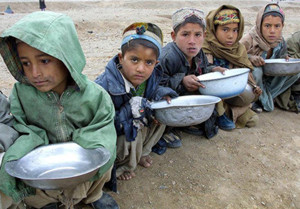By Scott Baldauf

Afghan children line up for food distributed by UNICEF at Maslakh refugee camp, approximately 6 miles west of Herat in western Afghanistan. (Photo: Behrouz Mehri/AFP/Getty Images)
They work hard; and despite their country's poverty and political instability, they play hard, too. Few Afghans have benefited more from the past 10 years of post-Taliban government than children, and few stand to lose more if their nation slips back under Taliban rule after US and NATO troops depart in 2014.
Some developments have been overwhelmingly positive, such as wider access to education. A decade after Taliban rule restricted girls' education, more than half of school-aged girls are in class, says the United Nations.
Other problems have been tougher to solve.
Afghanistan has the world's highest infant mortality rate, according to the UN, and 1 of every 4 children dies before age 5. Half a trillion dollars of military assistance and $57 billion in direct aid seem to have had little impact on the nation's economy. One in 3 Afghans lives on less than $1 a day, the UN says.



